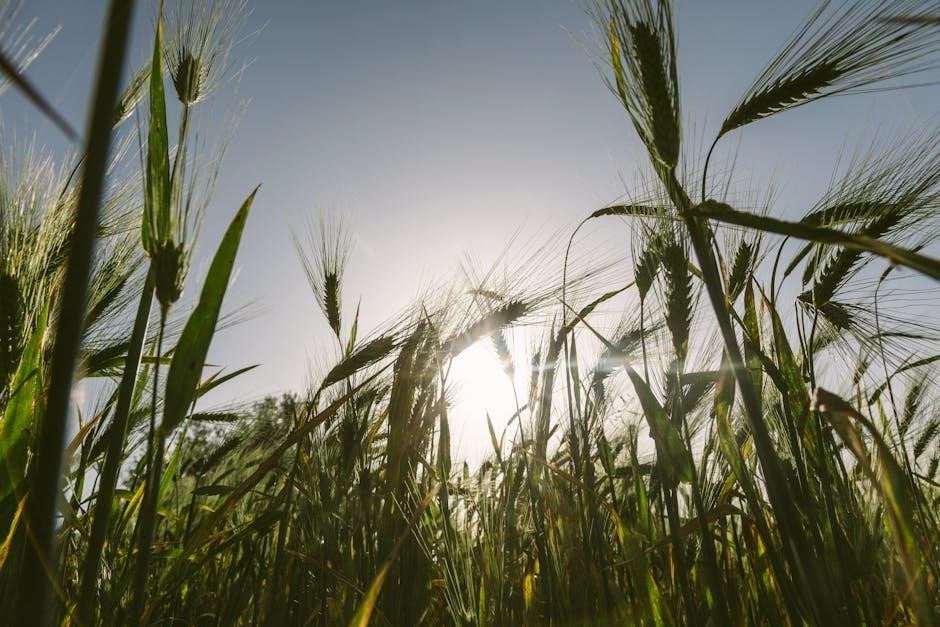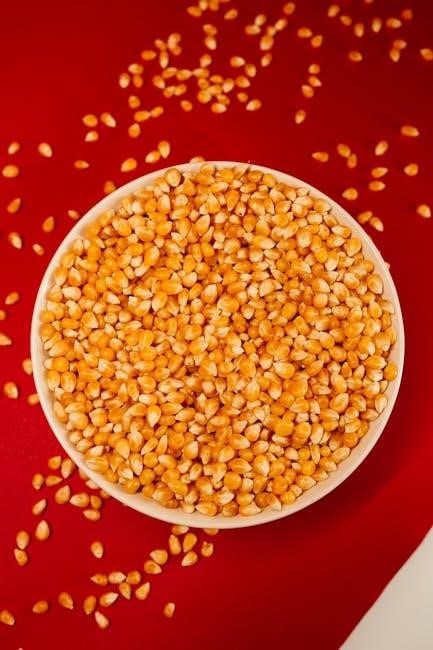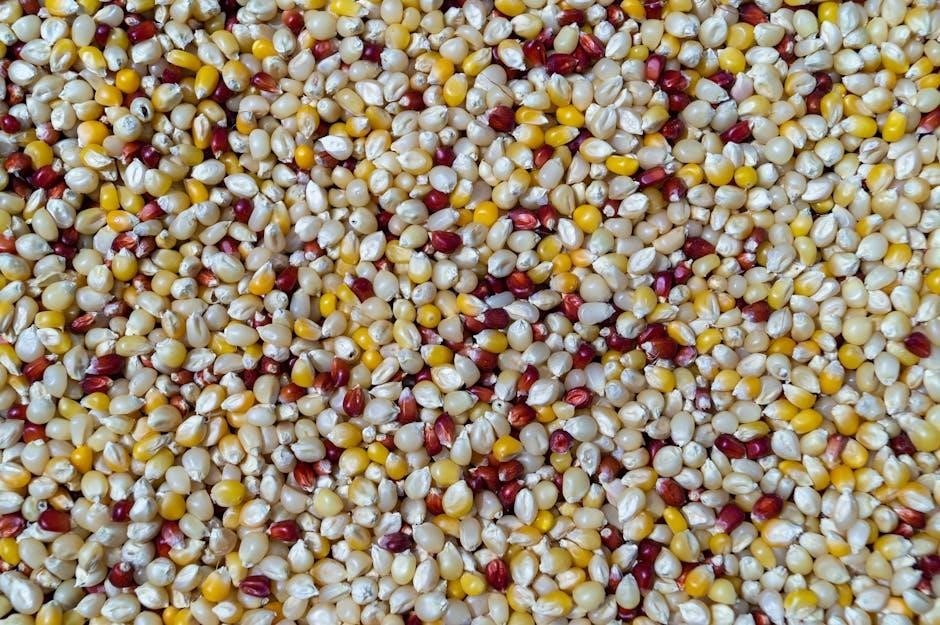Dekalb Corn Seeds are renowned for high performance and adaptability, offering tailored solutions for diverse agronomic needs. With a legacy spanning over a century, Dekalb delivers innovative, sustainable corn hybrids, supported by the comprehensive 2024 Dekalb Seed Guide.
History of Dekalb Seeds
Dekalb Seeds has a rich history dating back to the early 20th century, emerging as a pioneer in hybrid seed development. Founded with a commitment to innovation, the company quickly became a leader in agricultural technology. Dekalb’s breakthroughs in corn hybridization revolutionized farming, offering higher yields and disease resistance. Over the years, the brand expanded its portfolio to include soybeans, canola, and other crops, while maintaining a focus on corn. Dekalb’s legacy is built on trust, research, and farmer-centric solutions, making it a cornerstone of modern agriculture. Today, Dekalb continues to innovate, leveraging advanced technologies like SmartStax hybrids to address evolving farming challenges. Its history reflects a dedication to sustainability and productivity, solidifying its reputation as a trusted partner for growers worldwide.
Benefits of Using Dekalb Corn Seeds
Dekalb Corn Seeds offer exceptional yield potential, adaptability, and resilience, making them a top choice for farmers. Their high-performing hybrids are bred to thrive in diverse conditions, ensuring consistent results. With built-in traits like disease resistance and pest protection, Dekalb seeds minimize risks and maximize productivity. Farmers benefit from tailored solutions that address specific soil types, climate zones, and farming practices. The seeds are designed to optimize water and nutrient use, promoting sustainable farming. Dekalb’s commitment to innovation ensures access to cutting-edge technology, such as SmartStax hybrids, which enhance yield and durability. By choosing Dekalb, growers gain a competitive edge, supported by expert recommendations and a legacy of trust. These seeds are a reliable investment for achieving higher yields and long-term agricultural success.
2024 Dekalb Seed Guide Overview
The 2024 Dekalb Seed Guide presents a comprehensive lineup of high-performance corn hybrids and soybean varieties, tailored for diverse farming conditions and optimal yield potential.
It highlights innovative solutions, sustainability, and expert recommendations, empowering farmers to make informed decisions for successful harvests in 2024 and beyond.
Key Features of the 2024 Guide
The 2024 Dekalb Seed Guide boasts an extensive array of high-performance corn hybrids designed to meet various agronomic needs. It includes detailed product descriptions, yield potential, and adaptability across different regions. Farmers can explore new canola and soybean varieties, alongside tailored recommendations for specific growing conditions. The guide emphasizes sustainability, featuring hybrids like SmartStax, which offers multiple modes of action against pests. Additionally, it provides insights into emerging trends and technologies, such as precision agriculture tools, to enhance decision-making. With its user-friendly format, the guide serves as a valuable resource for maximizing productivity and overcoming field challenges in the 2024 planting season.
How to Download the 2024 Seed Guide
The 2024 Dekalb Seed Guide is easily accessible online, providing farmers with a comprehensive resource for planning their planting season. To download the guide, visit the official Dekalb website and navigate to the “Resources” or “Seed Guides” section. Click on the 2024 Seed Guide link, and follow the prompts to download the PDF. The guide is also available in a digital format, allowing farmers to access it on mobile devices. Additionally, users can request a printed copy through Dekalb’s customer service. The guide is free to download and offers detailed insights into Dekalb’s corn hybrids, canola, and soybean varieties, ensuring farmers are well-equipped for the upcoming season.

Understanding Dekalb Corn Hybrids
Dekalb Corn Hybrids are tailored to enhance performance through genetic diversity and advanced traits. They offer resilience, yield potential, and pest resistance, optimized for various farming conditions.
What Are Corn Hybrids?
Corn hybrids are high-performing seed varieties developed through controlled pollination of different corn parent lines. They combine desirable traits like yield potential, disease resistance, and adaptability to various environments. These hybrids are tailored to meet specific farming needs, ensuring optimal growth and resilience. Dekalb Corn Hybrids, for example, are engineered to thrive in diverse conditions, offering farmers reliable performance and higher yields. By leveraging advanced genetic research, hybrids like Dekalb’s SmartStax technology provide multi-mode pest resistance, making them ideal for challenging agricultural environments. This approach ensures sustainable and productive cropping systems, benefiting farmers globally.
Importance of Hybrid Selection
Selecting the right corn hybrid is crucial for maximizing yield and adapting to specific farming conditions. Each hybrid is bred for unique traits, such as drought tolerance, pest resistance, or high yield potential, making them suitable for different environments. Dekalb hybrids, for instance, are designed to perform well across various regions and soil types. Proper hybrid selection ensures that farmers can optimize their resources, reduce risks, and achieve better crop outcomes. By aligning the hybrid’s characteristics with their farm’s conditions, growers can enhance sustainability and profitability. This tailored approach is essential for modern agriculture, where environmental and market demands are increasingly complex.
Choosing the Right Corn Hybrid
Choosing the right Dekalb corn hybrid ensures optimal yield and adaptability to your farm’s conditions, supported by the 2024 Seed Guide and expert recommendations for maximum performance.
Factors to Consider for Hybrid Selection
When selecting Dekalb hybrids, consider yield potential, soil type, and moisture levels. Climate and pest resistance are crucial, as well as growth period and disease tolerance. Additionally, regional suitability and management practices play a significant role in ensuring optimal performance; The 2024 Dekalb Seed Guide provides detailed insights to match hybrids with specific farm conditions, ensuring maximum yield and sustainability. By evaluating these factors, farmers can make informed decisions tailored to their unique agricultural needs.
Regional Suitability of Dekalb Hybrids
Dekalb hybrids are bred to excel in diverse regions and conditions, ensuring adaptability across varying climates and soil types. Their robust performance in both high-yield and challenging environments makes them suitable for a wide range of geographic locations. The 2024 Dekalb Seed Guide highlights specific hybrids tailored to regional needs, such as moisture levels, temperature fluctuations, and pest pressures. For example, SmartStax hybrids are ideal for corn-on-corn areas, offering superior protection against key pests. Farmers in different regions can rely on Dekalb’s expertise to select hybrids that thrive in their local conditions, maximizing productivity and sustainability. This regional focus ensures Dekalb remains a trusted choice for growers worldwide.
Planting Dekalb Corn Seeds
Planting Dekalb Corn Seeds requires optimal timing and soil preparation to maximize yield potential. The 2024 guide provides region-specific planting recommendations for ideal growth conditions.
Optimal Planting Times for Dekalb Corn
Determining the optimal planting times for Dekalb corn is crucial for maximizing yield and resilience. The 2024 Dekalb Seed Guide emphasizes that planting should occur when soil temperatures consistently reach 50°F to 55°F, typically in late spring after the last frost. Early planting allows the crop to take advantage of moisture and cooler temperatures, promoting healthy germination and growth. However, farmers must balance this with field readiness and weather forecasts to avoid early stress from cold snaps or excessive moisture. The guide also provides region-specific recommendations, ensuring farmers adapt planting schedules to their local climate zones for optimal results.
Soil Preparation Tips
Proper soil preparation is essential for maximizing the potential of Dekalb corn seeds. The 2024 Dekalb Seed Guide recommends testing soil to determine pH and nutrient levels, ensuring optimal conditions for germination and growth. Tillage should be minimized to preserve soil structure and organic matter, while incorporating compost or manure can enhance fertility. Planting Dekalb hybrids in well-draining, fertile soil promotes healthy root development and strong plant growth. Additionally, the guide suggests implementing conservation tillage and cover cropping to improve soil health and reduce erosion. By following these practices, farmers can create a conducive environment for their Dekalb corn to thrive, leading to higher yields and better stress tolerance throughout the growing season.

Managing Dekalb Corn Crops
Dekalb corn crops require tailored management practices to optimize yield and resilience. The 2024 Seed Guide offers expert advice on fertilization, pest control, and sustainable farming techniques.
Fertilization Recommendations
Proper fertilization is critical for maximizing Dekalb corn yields. The 2024 Seed Guide emphasizes balanced nutrition, starting with soil tests to determine nutrient levels; Nitrogen, phosphorus, and potassium are key, with applications timed to match growth stages. Dekalb hybrids, like SmartStax, benefit from optimal nutrient availability to resist stressors. The guide recommends split applications to avoid over-fertilization and reduce environmental impact. Micronutrients, such as zinc and sulfur, may also be necessary based on soil analysis. By following these recommendations, farmers can ensure their Dekalb corn crops receive the nutrients needed for robust growth and high productivity, aligning with sustainable practices.
Pest and Disease Management
Dekalb corn hybrids, such as SmartStax, are designed with built-in resistance to key pests like corn rootworm and earworm, reducing the need for additional treatments. The 2024 Seed Guide highlights integrated pest management (IPM) practices, combining genetic resistance with crop rotation and timely scouting. Regular monitoring for pests and diseases ensures early intervention, minimizing yield losses. Soil health and optimal planting conditions further enhance resilience. By adhering to Dekalb’s recommendations, farmers can effectively manage threats while maintaining environmental sustainability. This balanced approach supports long-term productivity and ecosystem health, aligning with modern farming practices.

Harvesting Dekalb Corn
Dekalb corn is ready for harvest when kernels reach physiological maturity. The 2024 Seed Guide recommends optimal timing and techniques to ensure maximum yield and quality.
When to Harvest Dekalb Corn
Dekalb corn is typically ready for harvest when kernel moisture reaches 20-25%, indicating physiological maturity. The 2024 Seed Guide emphasizes timing for optimal yield and quality. Farmers should monitor kernel drydown and stalk integrity. Harvesting too early or late can reduce yield and profitability. For specific hybrids, consult the guide for maturity ratings. Proper timing ensures efficient drying and storage, minimizing losses. Delaying harvest may lead to lodging or pest issues. Use combine settings to minimize kernel damage. Harvesting at the right time is crucial for maximizing Dekalb corn’s potential. Always follow local conditions and guide recommendations for best results.
Harvesting Tips for Maximum Yield
For optimal yield, harvest Dekalb corn when kernel moisture reaches 20-25%, ensuring minimal waste and high-quality grain. Adjust combine settings to minimize kernel damage and losses. Monitor header height to reduce ear drop and stalk lodging. Harvest in a timely manner to avoid lodging and pest damage, as delays can lower yield. Use proper drying techniques to preserve grain quality. Regularly clean and maintain equipment to prevent contamination. Consider night harvesting to reduce moisture variability and improve efficiency. Always follow local conditions and Dekalb’s 2024 Seed Guide recommendations for specific hybrids. Proper harvesting practices maximize Dekalb corn’s genetic potential and ensure a profitable harvest.
Sustainability in Corn Farming
Dekalb Corn Seeds support sustainable practices by optimizing resource use and minimizing environmental impact, ensuring eco-friendly farming while maintaining high yields and productivity for future generations.
Environmental Impact of Dekalb Seeds
Dekalb seeds are designed to minimize environmental impact through improved resource efficiency and reduced input needs. Their high-performance hybrids promote sustainable farming by optimizing water and nutrient use, lowering greenhouse gas emissions, and enhancing soil health. By developing seeds resistant to pests and diseases, Dekalb reduces the reliance on chemical pesticides, contributing to biodiversity preservation. Additionally, their focus on region-specific hybrids ensures that crops are well-suited to local conditions, minimizing waste and the carbon footprint associated with transportation. Dekalb’s commitment to innovation supports eco-friendly practices, helping farmers maintain productivity while protecting the environment for future generations.
Sustainable Practices for Corn Growers
Dekalb Corn Seeds promote sustainable farming practices by offering high-yield, disease-resistant hybrids that reduce the need for excessive inputs. Farmers can optimize water and nutrient use through precise seed selection tailored to their region. By choosing hybrids with built-in resistance to pests and diseases, growers can minimize chemical pesticide applications, reducing environmental contamination. Additionally, Dekalb’s focus on region-specific hybrids ensures crops are well-suited to local conditions, minimizing waste and improving resource efficiency. These practices not only protect the environment but also enhance long-term soil health and biodiversity, ensuring productive farmland for future generations while maintaining economic viability.

Technology in Corn Farming
Dekalb leverages precision agriculture and advanced seed technology to optimize yields and reduce environmental impact, ensuring sustainable and efficient corn farming practices for modern growers.
Role of Precision Agriculture
Precision agriculture plays a pivotal role in modern farming by integrating advanced technologies like GPS, drones, and data analytics to optimize crop management. Dekalb corn seeds benefit from these tools, which enable farmers to monitor soil conditions, track growth stages, and apply inputs precisely. This approach enhances yield potential, reduces waste, and promotes sustainable practices. By leveraging real-time data, farmers can make informed decisions, ensuring their fields operate efficiently. Precision agriculture also supports climate resilience by optimizing water and nutrient use, aligning with Dekalb’s commitment to innovative and environmentally friendly farming solutions. This technological advancement is a cornerstone of the 2024 Dekalb Seed Guide, empowering growers to achieve peak productivity while minimizing environmental impact.
Data-Driven Decision Making
Data-driven decision making is essential for maximizing the potential of Dekalb corn seeds. The 2024 Dekalb Seed Guide provides farmers with actionable insights and data tools to optimize planting, fertilization, and pest management. By leveraging advanced analytics, growers can identify optimal hybrid selections, soil conditions, and weather patterns to enhance yield. Dekalb’s expertise, combined with real-time data, empowers farmers to make informed decisions tailored to their specific fields. This approach ensures precision, efficiency, and sustainability, aligning with Dekalb’s commitment to innovation and environmental stewardship. Data-driven strategies are crucial for achieving peak productivity and long-term success in corn farming, supported by Dekalb’s comprehensive resources and expert recommendations.
Expert Recommendations
Dekalb experts provide tailored advice to maximize yield and sustainability. The 2024 Seed Guide offers insights into hybrid selection, planting times, and soil management, ensuring optimal results for farmers.
Dekalb Expert Tips for 2024
Dekalb experts recommend selecting hybrids tailored to specific growing conditions for optimal yield. The 2024 Seed Guide highlights SmartStax hybrids for corn-on-corn acres, offering robust insect protection. Planting at optimal soil temperatures and ensuring proper soil preparation is crucial for maximizing germination rates. Farmers are advised to monitor moisture levels and adjust planting depths accordingly. Additionally, experts emphasize the importance of fertilizer application timing and soil health management to enhance nutrient uptake. Regular scouting for pests and diseases is also encouraged to prevent yield losses. By leveraging Dekalb’s data-driven insights and precision agriculture tools, growers can make informed decisions to achieve higher yields and sustainability in their operations.
Testimonials from Farmers
Farmers consistently praise Dekalb corn seeds for their high yield potential and adaptability. Many report increased productivity due to the seeds’ robust performance in diverse conditions. “Dekalb hybrids have been a game-changer for my farm,” says one grower, highlighting improved disease resistance and stress tolerance. Another farmer noted, “The 2024 Seed Guide helped me choose the perfect hybrid for my soil type, boosting my yield by over 10%.” Farmers also appreciate the comprehensive support and expert recommendations provided by Dekalb, ensuring they make informed decisions. These testimonials underscore Dekalb’s commitment to delivering reliable, high-performing products tailored to meet the unique needs of agricultural professionals.

Market Trends in Corn Farming
The 2024 corn market reflects growing demand for sustainable practices and high-yield hybrids. Dekalb seeds align with these trends, offering innovative solutions to enhance productivity and profitability for farmers.
2024 Market Outlook for Corn
The 2024 market outlook for corn farming appears promising, driven by increasing demand for sustainable and high-yield crops. With global focus on food security and agricultural resilience, corn production is expected to rise. Dekalb corn seeds, known for their adaptability and performance, align with these trends, offering farmers reliable solutions to meet market needs. The 2024 Dekalb Seed Guide highlights innovative hybrids designed to thrive in diverse conditions, ensuring strong yields and profitability. As weather patterns and pest pressures evolve, Dekalb’s technology-driven approaches are poised to support farmers in navigating challenges. This year, the emphasis on precision agriculture and data-driven practices will further enhance corn farming efficiency, making 2024 a pivotal year for growth and innovation in the industry.
Future of Corn Farming
The future of corn farming is poised for transformation, driven by advancements in technology and sustainable practices. Dekalb corn seeds are at the forefront, offering innovative hybrids tailored to address climate change and evolving market demands. Precision agriculture and data-driven decision-making will play a crucial role in optimizing yields and reducing environmental impact. Farmers can expect enhanced disease resistance, drought tolerance, and higher yield potential in future Dekalb hybrids. Additionally, the integration of smart farming tools will enable growers to make informed decisions, ensuring long-term profitability and sustainability. With a focus on innovation and environmental stewardship, the future of corn farming looks promising, supported by Dekalb’s commitment to advancing agricultural excellence.
Dekalb Corn Seeds excel in performance and sustainability, supported by the 2024 Seed Guide. Their legacy ensures high yields, adaptability, guiding farmers toward a prosperous future.
Final Thoughts on Dekalb Corn Seeds
Dekalb Corn Seeds are a trusted choice for farmers seeking high performance and reliability. With over a century of innovation, they offer tailored solutions for diverse farming conditions. Their robust hybrids, like SmartStax, provide superior protection against pests, ensuring optimal yields. The 2024 Seed Guide highlights their commitment to sustainability and adaptability, making them a leader in modern agriculture. Farmers can rely on Dekalb for consistent results, supported by expert recommendations and cutting-edge technology. By choosing Dekalb, growers not only enhance their yields but also contribute to environmentally friendly practices. Dekalb’s dedication to excellence ensures a bright future for corn farming worldwide.
Looking Ahead to Future Harvests
As agriculture evolves, Dekalb Corn Seeds continues to lead with innovative solutions tailored to future challenges. Their commitment to sustainability and precision agriculture ensures farmers are equipped for climate resilience and yield optimization. By leveraging advanced technology and data-driven insights, Dekalb supports growers in achieving long-term success. The 2024 Seed Guide underscores their dedication to adaptability, offering hybrids like SmartStax for enhanced pest resistance. With a focus on environmental stewardship, DekalbCorn Seeds are poised to remain a cornerstone of sustainable farming. Farmers can trust Dekalb to deliver high-performing, adaptable hybrids, ensuring prosperous harvests for generations to come. Their forward-thinking approach aligns with global agricultural goals, making them a trusted partner in modern farming.
